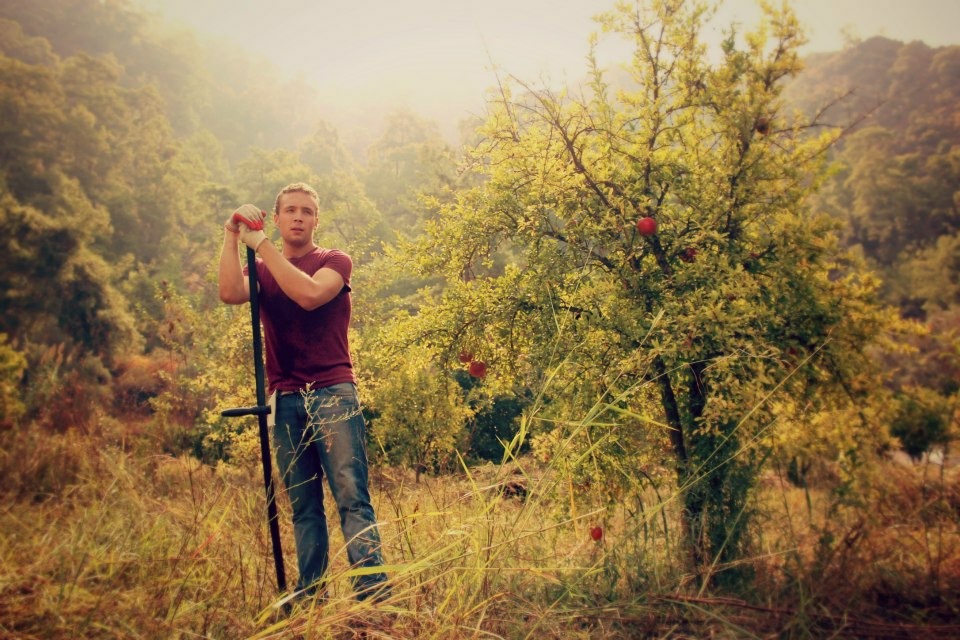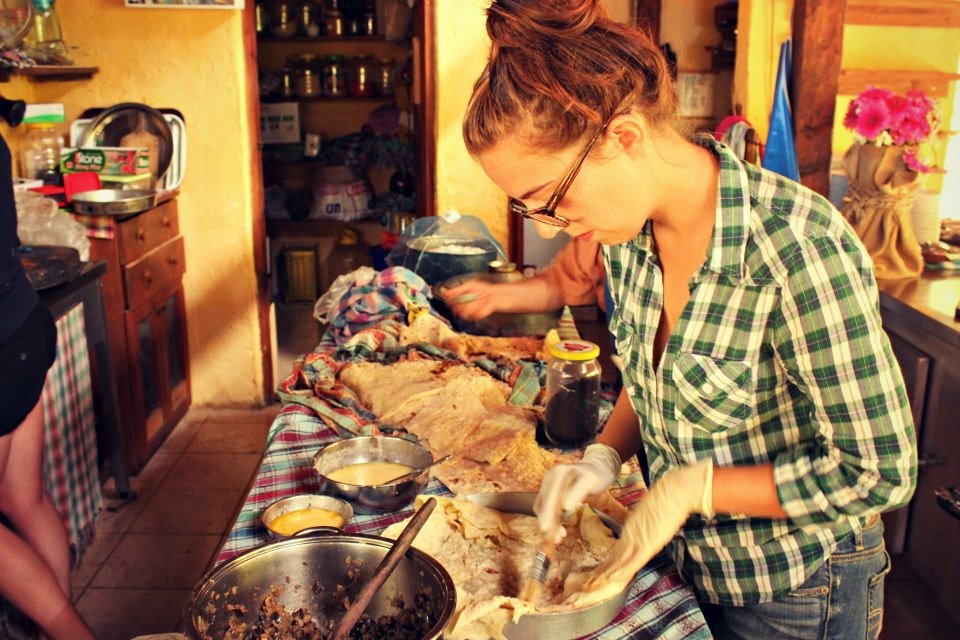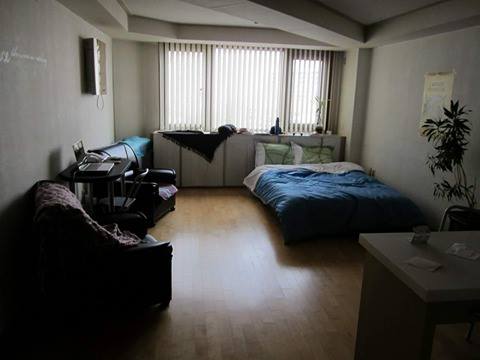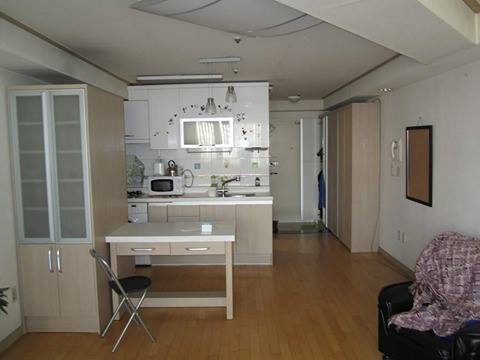Accommodations are often the priciest part of a trip — whether you book a hotel, hostel, bed and breakfast or Airbnb.

But they don’t have to be. If you’re ready for an adventure, there are plenty of ways (other than couchsurfing) to pay nothing for your room when you travel.
Yes, your stay in a fancy French chalet, a charming Italian B&B, quaint South Korean apartment, or on a luxurious cruise ship can be free.
And who couldn’t use more money to enjoy the local food, drinks and sights?
These are seven tried, tested and true ways to make it happen:
1. House sit
2. Do a work-stay
3. Work on a ship
4. Teach English
5. Work as an au pair
6. Barter
7. Become a social influencer
Jump to the travel adventure you want to learn more about by clicking the links above or read on for the specifics.
1. House sit
Former Torontonian Nora Dunn, aka The Professional Hobo, is the queen of free accommodations. She spent less on lodging one year than many people pay for one month’s rent.
In her e-book, the travel blogger writes her average annual housing expense between 2007-12 was $1,428 — and as low as $173 in 2011.
“In my first five years of full-time travel, I saved over $63,000 on accommodation expenses living in beautiful places around the world,” she told Global News.
She’s been to more than 50 countries since she unshackled herself from her financial planning business 10 years ago, and sold all her belongings for a life of travel.
Her house-sitting highlights include a stint in New Zealand, Peru, England, an alpine cottage in Switzerland, and six months on the Caribbean island of Granada.
“I absolutely loved it,” she said. “House sitting is becoming an increasingly popular way for people to travel the world, not only because it’s free accommodation but it can provide a culturally enriching experience by living locally.”
Responsibilities will vary, but she says sometimes they’re as simple as checking the mail once in a while.
There’s a lot of competition, though.
She suggests signing up for the Caretaker Gazette and checking out some of her go-to sites (there’s usually an annual fee for applicants, but they’re free to browse):
Dunn thinks it’s important to do three things if you want to land one of the openings:
- Have a rock-solid, well-filled out profile with testimonials.
- Sign up for email alerts so you can respond to new postings immediately (homeowners can become inundated with responses).
- Treat it like a job. You’ll be responsible for someone’s home and their precious belongings.
When you start out, it may help to get some testimonials from friends whose pets you’ve watched or whose plants you’ve watered.
Keep in mind it will probably take a few tries. Even with all of Dunn’s experience, she may only get one response for every seven messages she sends out.
“Cast the net wide, apply lots, and eventually you’ll find one.”
I am the section you’re linking to.
2. Do a work-stay
If you’re not afraid to try something different, there are plenty of rewarding volunteer opportunities that can earn you free room and board.
“I’ve done everything from painting murals, to designing marketing plans, to cooking at retreat centres, to milking goats, and managing hostels,” Dunn said.
The experience was “life-changing” for Caroline Leal, a 30-year-old from Ottawa. She and her boyfriend Matt Purchase, 28, enjoyed about three months of free nights thanks to three work-stays in Europe and Asia.
“Our most significant work-stay was in Thailand, where we stayed for a few months teaching English to local kids in the morning,” Leal recalled.
Their afternoons were spent documenting community projects.
“Our Thai host became like our surrogate father. After we were done our ‘work’ for the day, we’d have dinner with him and another local family, every single night.”

Get daily National news
They cried when it was time to part ways. They came back to visit two years later.
Leal said their accommodations varied as much as the work-stays. In Thailand, their accommodations were in a school during the week. On weekends, they were “spoiled” in a tree house.
During their stay at an eco-hostel in Portugal, where Leal cooked and cleaned and her boyfriend refinished bungalows, they slept in a cozy cabin.
On a farm in Turkey, they crashed in a tent with WiFi after pruning trees and making mud huts. That job was the toughest.
“There are language barriers, the work may be new,” Leal admitted, “but that’s why the experience is unique.”
Both Leal and Dunn recommend the site WorkAway, which offers “volunteering and cultural exchanges” in more than 155 countries.
Another popular option is WWOOF. It “connects people who want to live and learn on organic farms” with those in need of assistance.
Dunn also found a lot of work-stay opportunities through the Caretaker Gazette.
I am the section you’re linking to.
3. Work on a ship
Fancy a few months (free or paid) on the open seas? Dunn lived on five boats as they cruised through the Caribbean for almost three months. In her e-book, she looks back at the time as one of her best and most freeing.
“I was amazed at how prevalent — and varied — gigs on boats are,” she wrote.
You don’t need sailing experience either. Dunn earned her keep as a hostess, which meant meal planning, shopping, cooking and cleaning, as well as snorkeling with guests on a different island each day.
The few sites she used to “tap into the nautical community” were:
She cautions that while jobs on “mega yachts” can pay well, you can expect to have your time “owned.” Life on cruise ships can be equally demanding, but also a ton of fun.
READ MORE: What are the cheapest places for Canadians to fly?
Kc Williams was fresh out of beauty school — with just three months of experience — when he decided he’d try to get a job on a ship.
“I wanted to travel and see the world for free and just have an adventure,” said the 28-year-old, who now works in a salon on Rodeo Drive in Los Angeles.
He credits where he is now to the hard work ethic he picked up eight years ago during a nine-month contract with the Carnival cruise line.
Williams recalls how he reached out to the company directly and asked what he needed to do to get hired. A few emails and an interview later, he was brought on board to do hair and teeth whitening for about $1,100 a week plus up to $600 in tips.
He sailed the Caribbean Sea around South and Central America, as well as the waters off England. His one day off each week was “always in some fabulous location.”
His room was small (maybe eight by 10 feet including a bathroom) and was shared with a bunk mate, though that didn’t bother him because he was barely ever there.
“The whole ship is your stomping ground … And you’re surrounded by ocean.”
Among the crew members he worked with were professional dancers (who had to audition and worked about 20 hours each week), “attractive” servers and bartenders, bubbly social hosts and talented chefs.
It’s an opportunity he recommends for any young person who can get it.
“You’re going to have fun and meet people … when you come home, you’re going to understand the world in a way none of your friends do.”
I am the section you’re linking to.
4. Teach English
Alissa Dion, of Grande Prairie, Alta., enjoyed a year-and-a-half of rent-free living in Seoul, South Korea.
She wanted to teach overseas around five years ago and heard contracts there were hard to beat.
“They paid for everything,” she said. “Plus I could travel to a lot of other Asian countries from there and living expenses were cheap.”
The school that hired her arranged her apartment and paid her about $2,000 a month. Applicants who don’t have an education degree, like Dion has, might earn a little less (she says you just need a bachelor’s degree of some kind to get a position).
All she had to worry about was $10 electricity bills and food, which was cheap if she dined out. A bowl of noodles would cost her $5-6.
“It gave me the opportunity to not only experience, but feel comfortable living in a completely foreign culture,” she said. “I really got to learn about myself during my time there.”
Her experience also helped land her a teaching job as soon as she got back to Canada.
I am the section you’re linking to.
5. Work as an au pair
Those who like children and crave a cultural exchange could also consider being an au pair, which is like a short-term nanny.
Catherine Abele Landry, a 36-year-old Edmontonian, had just finished university and wanted a taste of life abroad before settling into her career. So she decided to take a four-month contract caring for three kids in a little village in the French Alps.
“The home was beautiful. It was a renovated centuries-old farm house … very modern inside. There was a swimming pool out back, a large delicious cherry tree, breathtaking mountain views, and plenty of space.”
Food was provided and she was paid about €70 a week for about 40 hours of work — not much, she admits, but enough to cover the occasional weekend getaway in Europe or dinner with other au pair friends.
The nearby University of Grenoble offered weekly French classes specifically for au pairs. At 28, she was the oldest in her class.
“The majority of au pairs there were between 19 to 23. There were a few 24 to 26-year-olds.”
But she wouldn’t trade the experience for anything.
“My favourite part about the experience was living with such a welcoming host family, which provided a deeper way for me to integrate within the local culture. I really felt at home,” said Abele Landry.
She was asked to speak English with the whole family, except for the youngest child — a four-year-old boy who “was a great teacher.”
“Four-year-olds have no filter and aren’t afraid to correct you when you say phrase something incorrectly!”
Prospective au pairs should to do their homework, though, she says. These are her tips:
- Don’t just settle for the first family that expresses interest in you. Ask lots of questions, and invite prospective families to ask questions of you. After all, it’s an important relationship you will be in for a significant amount of time.
- Be sure to know what the family’s expectations are of you before you go (i.e. wages, time off, work duties/chores/other responsibilities, and how they wish for you to engage with the children).
- Speak with the family over the phone, FaceTime or Skype. You can get a real sense of people when you talk over the phone or, ideally, have face-to-face conversations. There can be a bit of a disconnect with email.
It’s important to “feel comfortable and at ease with each other,” she stresses, “and feel an overall sense of positivity before making an agreement.”
6. Barter
Travellers who want la dolce vita with a little less effort can trade their skills for a stay in one of thousands Italian B&Bs, as part of the country’s “Barter Week.”It happens the third week of November, which falls between Nov. 14 and 20 in 2016 (so you’d have to be open to a last-minute getaway). Some B&Bs are flexible with dates and duration. More than 800 of them also accept barters year-round.Hosts often look for help around the home: yard work, renovations, painting, or plumbing repairs. Those make up roughly 20 per cent of the exchanges.Marketing expertise is in demand, as well, with 15 per cent of owners opting for either translation services, a social media page, new photos or a website.In 10 per cent of cases, local delicacies — like maple syrup — could be your way in. Others might settle for a lesson in a talent like the tango, yoga, knitting, guitar or astrology.These are a few of this year’s winning offers:- Artistic sculptures for a stay in Tuscany
- Harvesting olives
- A Capoeira performance
- A home-cooked East Indian dinner
7. Become a social influencer
Those who have a large following on social media might be able to convert that reach into perks like free accommodation, as well as complimentary flights.
It’s worked for full-time travellers Jessica and Garrett Gee, along with their two young kids. They’ve been on the move since August 2015, when they sold all their belongings for US$45,000, which has helped fund their globe-trotting.
WATCH: How the Bucket List Family handles travelling the world

They’re known as the “Bucket List Family” online, and have built up 615,300 followers between their four Instagram accounts.
Jessica tells Global News they regularly receive offers from airlines, hotels and other companies eager to place a product into their audience’s feeds.
“Influencers are the new celebrity endorsements,” according to Forbes.
READ MORE: Social media stars share their secrets to making money on Instagram and YouTube
So start that travel blog you’ve always dreamed of. It’s never too late.
Whichever route you choose, hopefully these ideas help pave the way to your next adventure.




















































Comments
Want to discuss? Please read our Commenting Policy first.